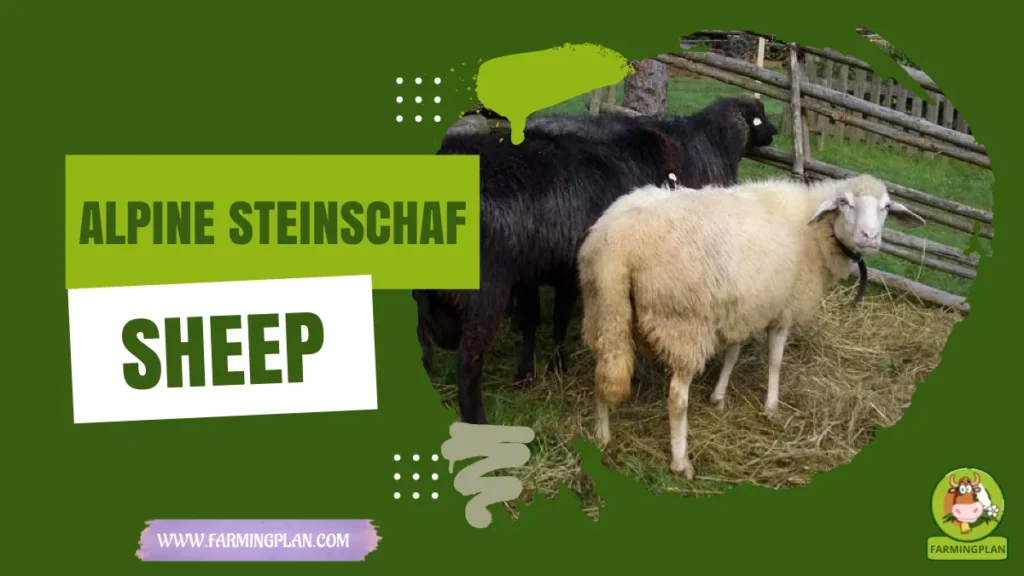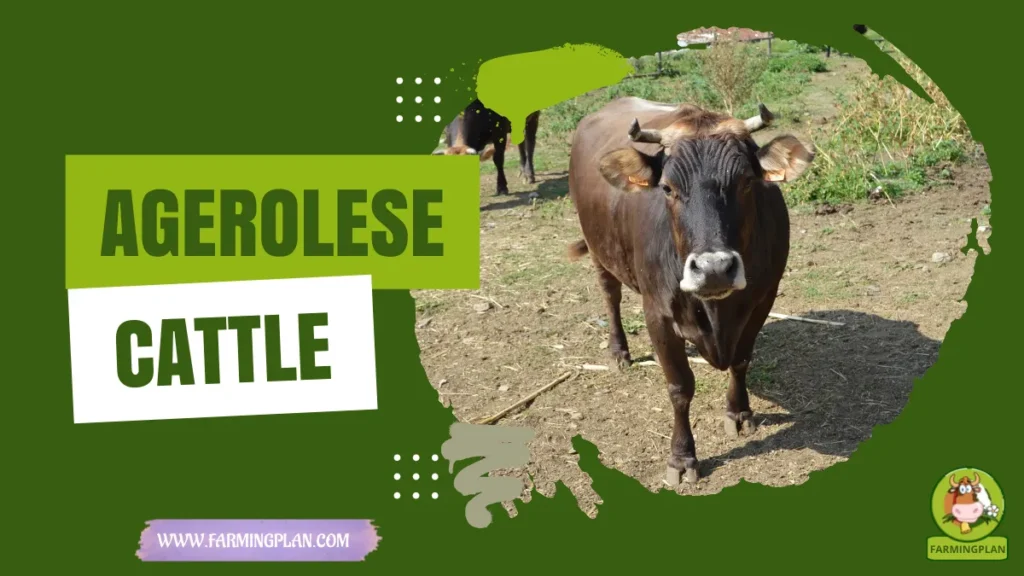Are you looking for a sheep breed that is perfect for small farms? Look no further than the Alpine Steinschaf sheep, an indigenous European species of domestic Sheep! This hardy and adaptable breed originates from the Eastern Alps of Austria and Southern Germany, where it has been used for centuries to provide wool, meat, and vegetation management. The Alpine Steinschaf’s unique traits make it ideally suited to life on small farms while their friendly disposition makes them easy to handle. If you’re interested in raising sheep on your farm but don’t know where to start – keep reading! We’ll discuss all the benefits this worthy animal can bring as well as how they can be cared for properly.

History & Origin
The Alpine Steinschaf sheep has a rich history that dates all the way back to the Eastern Alps of Austria and southern Germany. This unique breed of domestic sheep has been used for many centuries as a source of wool, meat and vegetation management. In its native region, the Alpine Steinschaf sheep was traditionally kept in herds by farmers, with each herd typically composed of between 50 and 300 individual sheep. Its striking features combined with its high productivity have made it an enduring choice for agricultural use in Europe – and even today, this strong and hardy breed can still be found thriving in remote areas across the alps.
Characteristics
The Alpine Steinschaf sheep is an attractive breed of domestic sheep native to Eastern Europe. With their black faces and white legs, they are easily recognized among other breeds. These animals are also renowned for their adaptability and resistance to harsh weather conditions, which has allowed them to remain in the mountainous regions of Austria and Germany for centuries. Wool production is one of the main characteristics of this breed – the soft wool is perfect for making warm garments due to its high loft, thermal insulation and water-holding capacity. Additionally, Alpine Steinschaf meat is known for being tender and aromatic due to their natural grass-fed diet; it is also a versatile product that can be used across many different types of dishes. Lastly, the breed’s grazing pattern helps maintain the vegetation in alpine meadows by keeping foliage short while allowing an even spread of nutrients throughout local ecosystems. All these distinctive qualities make the Alpine Steinschaf a truly unique breed of sheep!
Feed
The Alpine Steinschaf sheep is an incredibly hardy breed of domestic sheep that is indigenous to the Eastern Alps of Austria and southern Germany. It has been bred to thrive on forage-based diets and its wool has historically been used for a variety of uses including clothing and bedding. Today, this breed of domestic sheep are primarily kept as a means of plant management due to their naturally large appetites and ability to graze even in rougher terrain. An added bonus is that their meat also has significant value for local farmers looking for an alternative option to beef or venison. All in all, it’s clear why the Alpine Steinschaf are popular among people living in areas near the Eastern Alps where these sheep thrive best.
Usage
The Alpine Steinschaf sheep is an incredibly versatile breed of sheep. Not only is its wool highly sought after, but this breed of sheep has also been traditionally used for meat production and vegetation management since it was first developed in the Eastern Alps of Austria and southern Germany. Its thick coat keeps it well protected from the elements, making them ideal for grazing in mountainous terrain and managing mountainous plant life. Even today, with many other animal sources available for wool, meat and vegetation management, the Alpine Steinschaf remains one of the top picks in terms of versatility and usefulness.
Special Feature
The Alpine Steinschaf sheep is known for being a hardy breed of sheep, making it well-suited to the rugged terrain of the Eastern Alps. It is both useful and robust—the wool of these animals can be spun into merino wool, while they also provide a source of meat, as well as helping manage vegetation. All things considered, the Alpine Steinschaf is an incredibly special animal that has been an integral part of sustainable mountain farming in Austria and Germany for centuries.
Benefits of Raising
Raising Alpine Steinschaf sheep on your small farm can offer a multitude of benefits. This hardy breed is native to the Eastern Alps of Austria and southern Germany, and has been developed over many centuries for wool, meat, and vegetation management. Growing in popularity among small farmers across Europe and beyond, the versatile Alpine Steinschaf sheep not only offers high quality meat, but also produces exceptional fleece that can be used for a range of textiles. In addition to providing economic opportunities through their saleable products, these sheep are increasingly being valued for their contribution to land conservation – with carefully managed grazing potentially leading to improved biodiversity in grasslands. All in all, raising Alpine Steinschaf on your small farm could be a highly rewarding experience offering several benefits both economically and environmentally!
Managing the Vegetation
The Alpine Steinschaf sheep is an incredibly versatile breed of sheep, essential to traditional methods of vegetation management in the Eastern Alps. This ancient breed has been used since the mid-1800s, and its dual purpose as both a provider of wool and meat, as well as a vegetation management companion, makes it highly sought after by those living or traveling through the region. With their long and hardy coats, Alpine Steinschaf sheep have proven themselves to be ideal for controlling unwanted vegetation over vast areas, so much so that other breeds have been adapted for similar duties in other parts of the world. The traditional knowledge and stewardship adopted by owners of these sheep connects us with Austrian heritage and history – one that should be celebrated and sustained.
Meat Production
The Alpine Steinschaf sheep is a breed of domestic sheep native to the Eastern Alps of Austria and southern Germany. It is well known for its production of wool, as well as it being used as a source of meat. In terms of wool production, the breed is prized for its quality, density and colour which makes it highly sought after in Europe. As far as its use in meat production, its lean muscle structure gives it an excellent flavour and versatility when cooked. The Alpines Steinschaf also has one additional benefit that sets it apart from other sheep breeds – it’s ability to be used for vegetation management. Its hardy nature allows farmers to effectively manage grasslands and prevent forest encroachment on alpine pastures. In summary, the Alpine Steinschaf has multiple uses that make it an ideal choice for both wool and meat production.
How to Care for Your Alpine Steinschaf Sheep
Properly caring for an Alpine Steinschaf sheep requires the same effort as taking care of any other type of domestic animal. Owners should provide daily exercise, clean and comfortable housing, and a safe environment for them to graze in. It is essential to keep up with routine health care check-ups, vaccinations, and deworming to ensure that the Alpine Steinschaf sheep stays healthy and happy. If shearing is required, as it is for wool production, be sure to perform it correctly to avoid injury or discomfort. Proper diet management through diet variety, nutritional supplementation and hay/pasture grazing will help your Alpine Steinschaf sheep thrive year-round. By engaging in conscientious practices like these on a regular basis, you can maintain the well-being of your Alpine Steinschaf sheep and reap the benefits that come along with it.
Final Thoughts
If you are looking for an all-purpose breed of sheep to raise on your small farm, the Alpines Steinschaf may be just what you need. With this breed, you can take advantage of the wool it produces for insulation and sale, as well as the meat for consumption and sale. In addition, it is adept at vegetation management due to its origins in the Eastern Alps of Austria and southern Germany. So, if you want versatile sheep that can provide quality outputs from multiple areas of production – the Alpines Steinschaf could absolutely be the right choice for your small farm.
FAQ
What are alpine sheep used for?
Alpine sheep, which are also referred to as mountain sheep, are a hardy breed of domesticated ovine that have been bred and raised for centuries principally by people living in mountainous regions. This powerful and agile breed is particularly well-suited to the chillier climes at high altitudes where they can be found grazing on grasses, herbs and other vegetation.
How do sheep survive in the alpine biome?
Sheep have successfully adapted to a wide variety of habitats, from arid deserts to high alpine biomes. In the alpine biome, sheep are able to survive because of their special adaptations and behaviors.
What is an Alpine sheep?
Alpine sheep, also known as Rhaetian sheep, are a breed of domestic mountain sheep from the Swiss Alps. Originating in the Roman era and first introduced to Southern Switzerland around 2000 years ago, Alpine sheep have since become an iconic part of Swiss culture.
Conclusion
After learning about the amazing benefits the Alpines Steinschaf provides, it’s no wonder why this breed of sheep has earned its title as a truly productive farm animal. The Alpine Steinschaf sheep is a well-rounded animal, with unique characteristics and natural capabilities. It is strong, sturdy and resistant to disease, making it an exciting livestock option for small farms and homesteads. Indeed, its ability to feed little while providing wool and meat products makes it ideal for resourceful projects and pastoralism. Plus, with proper care and management one can optimize the productivity of these animals to maximize results! Ultimately, if you are considering adding the Alpines Steinschaf to your small farm or homestead this wonderful breed of sheep is definitely worth your consideration.

